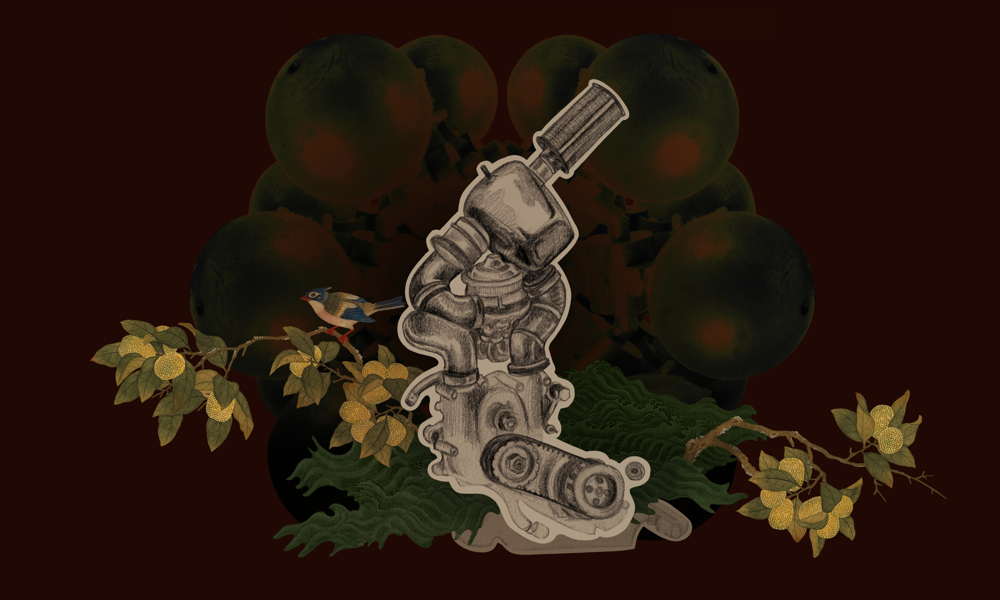Scientific Spirituality
And the Spirit of Science

Mein ganzes inneres Wirken erwies sich als eine lebendige Heuristik, welche, eine unbekannte geahnete Regel anerkennend, solche in der Außenwelt zu finden und — in die Außenwelt einzuführen trachtet.
My whole inner working showed itself like a living heuristic, which while obeying an unknown intuited rule, seeks to find the same in the outer world - and to introduce it into that outer world.
Goethe, Maximen und Reflexionen
I see young people hungering for the union of science and spirit: for the right to profound communicable experience with a good conscience, a sense that we can gain back the core human adventure without resorting to delusion and grandiose error. That if spiritual development has a basis in anything but pathology, that it must therefore yield to scientific investigation. That the problem can be framed in terms of unknown planes of causality which still elude our analytic and anatomical methods. There are many traditional disciplines which we know work, but we don't know why: the old attitude didn't need to know why. What we are increasingly unwilling to tolerate any longer, is the assumption that if we don't understand it, it must not exist: in fact, this is highly unscientific. We are not somehow more intelligent than our ancestors: in many ways the situation is reversed. The accumulated evidence says: the more ancient the practice, the more likely it is to be valid and worth taking seriously. For example, meditative discipline works: not only does it "reduce stress", it has the power to permanently reshape a psychosomatic topology.
In this domain, what I call "cargo cult scientificality" must be defended against vigorously: we must not give in to gratifying postures of certainty we have not earned - most science is popularly presented in the priestly garb of pseudoscience, and most of the spiritual schemes around us now take this very same pseudoscientific posturing as prerequisite. One hears the scientists lobbing the charge "pseudoscience" more often than before: perhaps this is because they feel their largely unrewarding toil has earned them a sole right to unscientific attitudes of certainty?
Somehow we have to give room sufficient for innate and superior knowledge to develop, without permitting the perennial arsehole, nor the insufferable hippy, nor the neon charlatan.
Somehow we have to avoid becoming mired in the bloodfeuds of epistemology, while providing a sufficiently cogent and satisfying theory of this kind of knowledge: we have to quench our thirst for scientific righteousness, while feeding our hunger for spiritual relevance. We have to find a way of knowing what we need to know, without lying to ourselves about how we know it.
We would like to develop a theory of method alongside our theory of result, in order to refine and accelerate future inquiry. With our newly hybridized scientific techniques, we would like to do more than justify ourselves and seem impossibly hip.
We would like to avoid constructing elaborate illusions of having arrived where we are through established practice. We would like to be honest about having stumbled and fumbled our way into clarity: but a theory of productive stumbling and fumbling is not therefore precluded.
Are we doing more than negotiating productive compromise between the forces that would possess our bodies? Building bridges of reconciliation between seemingly incompatible modalities of the past? Are we merely greedy for authority? In our haste to unite the reductive powers of science with the holistic redemptions of spirituality, are we doing more than borrowing and abusing technical vocabulary, or are we beginning to accurately and evocatively describe subjective experience? Isn't precise description the bedrock of good science? And isn't the ability to formulate ever more articulate questions the jackhammer leading to this bedrock? And how do we become articulate in our inquiry, but by borrowing and inventing technical vocabulary?
Despite all the abuse it's received, the concept "soul" is not entirely dispensable. Higher-order emergent patterning, the mysterious recursions of complexity, and everything tantalizing about synergetics, speaks of "soul", doesn't it? What's initially so easy to regard as mere epiphenomena, sheen, byproduct, at some hypercritical moment, seems to reach out of an ether and pluck a sympathetic string in the pluripotent present. At this time our notion of unidirectional agency is challenged: our conceptualizations of causality have been naïve and a little blockheaded. The reductionist perspective is a useful discipline and the gleaming scalpel of Western science - but it blinds us to circularity, dependent co-arising, and more subtle causation models. Sometimes the whole guides the parts. Sometimes our dreams speak with a clarity and prophecy that cannot be denied. Sometimes we just know things we can't explain.
But the first thing I need to say after having articulated this, is that this knowledge and this practice is not for everyone. Most human creatures are so far gone down the road of self-deception, mendacious hypochondria, and entrenched wishfulness in relation to everything "holistic" - they may name it morality, idealism, or increasingly just "self-care" - that even the word "intuition" entails far too much trust for apenature not to abuse it.
Reductionism is not a necessarily more true vision of the world, it is a method for dealing with the human proclivity to lie to itself. One of the most common blunders I find among the low-level wouldbe scientists with which we are surrounded, is to confuse efficacious method with objective modeling. We have become extremely adept at analyzing into constituent parts, we have yet to begin to learn to assemble into wholes.
It's telling that the initially clunky assumptions of thermodynamics in postulating a bounded system, form the basis of the only scientific account of a whole. Thermodynamics was invented for the analysis of machines - specifically steam and combustion engines. The world as machine, the body as machine, life as machination: this familiar Cartesian perspective makes us comfortable enough to draw a line around an assemblage of parts and ask, how does the whole operate? Or how does complexity within limitations affect the behavior of the system as a whole?
But Descartes was not the first modern philosopher, he was the last of the scholastics. The machine does not threaten the foundations of scholastic logic: we retain deduction as the leading actor, while inductive inference remains in the background and at the edges - as mere "application" and the preliminary stages. This obscures the fact that everything deductive logic accomplishes, is mere tautology. Most "proofs" are arrived at after the fact. It is in the midst of inductive inference that everything essential to science happens - that is, in the margins: hypothesizing, synthesizing, realizing, guessing, understanding. Syllogistic logic still struts around as crown prince, but it is inductive inference that quietly knits the whole endeavor of science together.
The purely descriptive phase of a given field requires more scientific acumen than the later reductionist experimental stages. Does anyone know this anymore? Does anyone possess an intellectual conscience alongside a fruitful imagination? This is why good anthropology is so hard to come by: most of them are not psychically malleable enough for an immersion, nor are they disciplined enough to describe ambiguous valence: they have neither realized subjectivity nor rigor - somewhat like comparing a Rothko to a Dürer.
This is also the case with almost all modern psychology, since psychology should properly be treated like an anthropological adventure. Most of civilized humanity, when in the presence of a novel experience don't become dumbfounded, they become "smartfounded" - they erase the novelty with certainty. They lack the character to assimilate new information: it requires humility, patience, and assurance to look into the unknown and perceive novelty. Mere intelligence among human beings is cheap and ubiquitous; character is expensive and rare.
Chinese and Ayurvedic medicine serve as a warning: we must not allow a medieval thirst for crystallinity to distract us from an elegant and articulate pedagogy. A psychologist in my sense, or a "spiritual practitioner" if you prefer polluted terms, should be trained like the naturalist was not so long ago: a cultivation of the art of field observation means learning to sketch the subject with delicacy and affection, to form working hypotheses in the midst of intense personal experience, to keep one's head even as one risks one's neck. This was once considered the status quo in the training of a worthwhile biologist. Despite the technocratic amplifications afforded by the age of the transistor, I believe science as formative discipline peaked in the 19th century - but not before producing such wunderkinds as Darwin, Freud, and the brief blossoming of anthropology. If what I'm outlining has any chance of improving our spiritual life, then it aims not at the achievement of a much-wished-for "objectivity", but at the formation of our intellect into a useful and precise instrument. Every instrument has bias and occludes more than it reveals: hence I don't seek a synthesis of my teachers, but refer to them like planetary influences and distinct astrological "stations". Any teacher worth his salt is almost incommensurate with every other. They should be treated and honored like local gods: in their vicinity we do them homage. It's hoped it will be understood I'm interested not in ostentatious namedropping, but that with every name I have a verifiable personal relationship: I have felt and seen something in their presence no one else could make me feel and see. This is why an intellectual life in my style should feel like an unforgettable party, wherein you drift from a life-changing conversation to ecstatic dance to introspection and back again. Those who know how to party don't merely goof off, they make medicine: the human being has constant need of medicine - that's what the Plains Indians are trying to tell us with that phrase. This is generally why I refuse to see spiritual life as some kind grandiose "entheogenic" enterprise: we're not becoming divine - our first job is to become fully human. Spiritual life is largely remedial, recuperative, and convalescent. It's not until we understand how badly we need medicine, that we begin to develop the special powers of the convalescent - almost everything worthwhile in spiritual practice is first generated as a psychosomatic scar. What sometimes seems to make the crises of modernity seem like peak human realization, is its potential for bizarre hypertrophic speciation: chronic psychosomatic disease largely crushes souls under its wheels like the juggernauts of old, but occasionally a fragment of some other ore is wedged just so and fires off in an improbable direction. We are such discarded pebbles. We are the ejecta of a catastrophe: may we one day raise the eyebrow of a beachside strolling geologist of the human soul, who can read past the wellworn surface into the same compressive and tensile forces with which he must still contend.


